Tony Stamp meets the people running some of New Zealand's smaller record labels, marketing and distributing music they love. It's often done in their free time, for little, if any, profit, but sometimes wins international audiences.
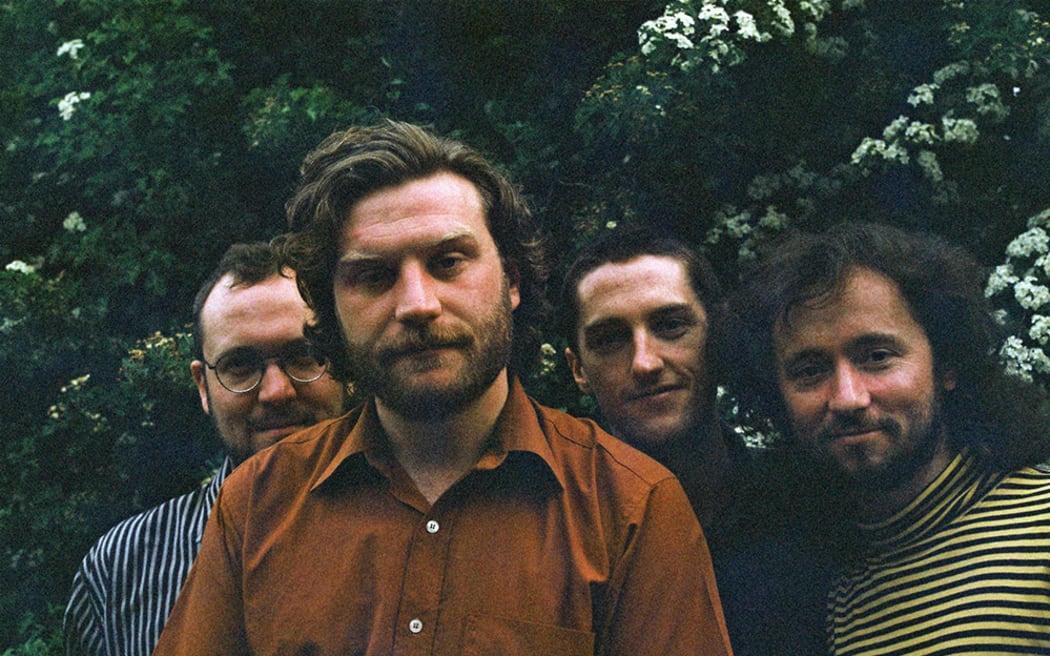
Wurld Series (Brian Feary, Luke Towart, Ben Woods, Ben Dodd) Photo: Supplied
In 2021, Christchurch record label Melted Ice Cream had an unexpected bit of success, when a review of one of their artists appeared on tastemaking American website Pitchfork.
The album was What’s Growing, by Wurld Series, whose drummer, Brian Feary, is the sole person behind the label. In addition to promoting and distributing its music, he also records and produces some of the bands, and looks after physical media, including cassettes he dubs himself.
“I feel like people care a bit more if there's a physical release,” he says. “So you've got the tape, you've done the photos, you've got the artwork. And you've put together some sort of press thing and send it to the right people. All of a sudden you've got a bit of a professional-looking release, and that means that your music is going to be heard by at least some bloggers or radio stations.”
This is what Brian calls the “due diligence” of running a label, and suspects it was this that led to the Pitchfork placement.
“It was really weird. This guy Shaad just emailed out of the blue asking for a SoundCloud link and a press kit. He liked one of the singles that was released.”
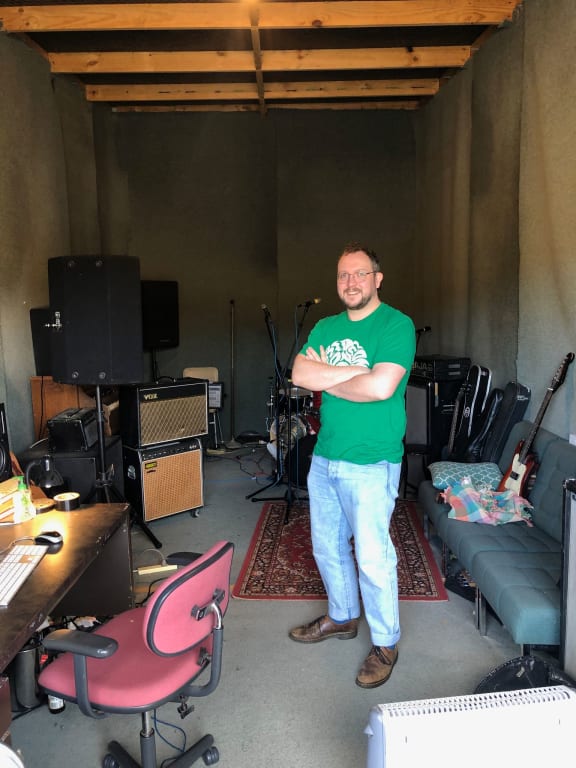
Brian Feary in the Melted Ice Cream practice space Photo: Tony Stamp
The label’s requirements are many, and Brian does them outside the demands of his full-time job, as a user experience designer for an American tech company.
“There's a lot of industry stuff that I'm aware of that I just don't do, because it's just a huge time-suck,” he says. “I wish I was better at plugging. I wish I was better at sending requests to stores, and more proactively selling things.
“At the same time, yes selling records is part of a label's business, but I think having the record heard is more important than selling physical units.”
In addition to Wurld Series, Melted Ice Cream houses Christchurch artists like Jim Nothing, Ben Woods, Best Bets, Salad Boys, and has done cassette runs for acts from Die! Die! Die! to Opposite Sex.
They have a relationship with a Spanish label called Meritorio, who organise vinyl pressing, and share the distribution of some of the acts. This means some Melted Ice Cream records reach the US and EU.
“We got a bunch of international blogs talking about Best Bets. A lot of the playlists that you see on Spotify that they’re on are European”, Brian says. “And Bandcamp always puts Melted Ice Cream releases on the front page, which I find quite cool.”
Originally founded by Joe Sampson, from the band Salad Boys, Brian inherited the roster around five years ago. He’d already been helping for years prior to that, and was happy to take over when Sampson quit.
“There was too much value in what we already had - the brand, the logo, and the music most importantly - for it to just be stopped. I couldn't bear the thought of it, I suppose.
Brian says he wants to “try and give a bit of a platform to some of these artists that possibly wouldn't have as much of a platform, or would find it a bit harder to do things [on their own]”.
This is achieved partly from his flat, where he mixes albums, and dubs cassettes, (“Typical runs are about 30, but for some we've done over 100”), and houses as-yet unsold stock: boxes of vinyl and cassettes which will go on sale at various artist’s tours, or via their pages on Bandcamp.com.
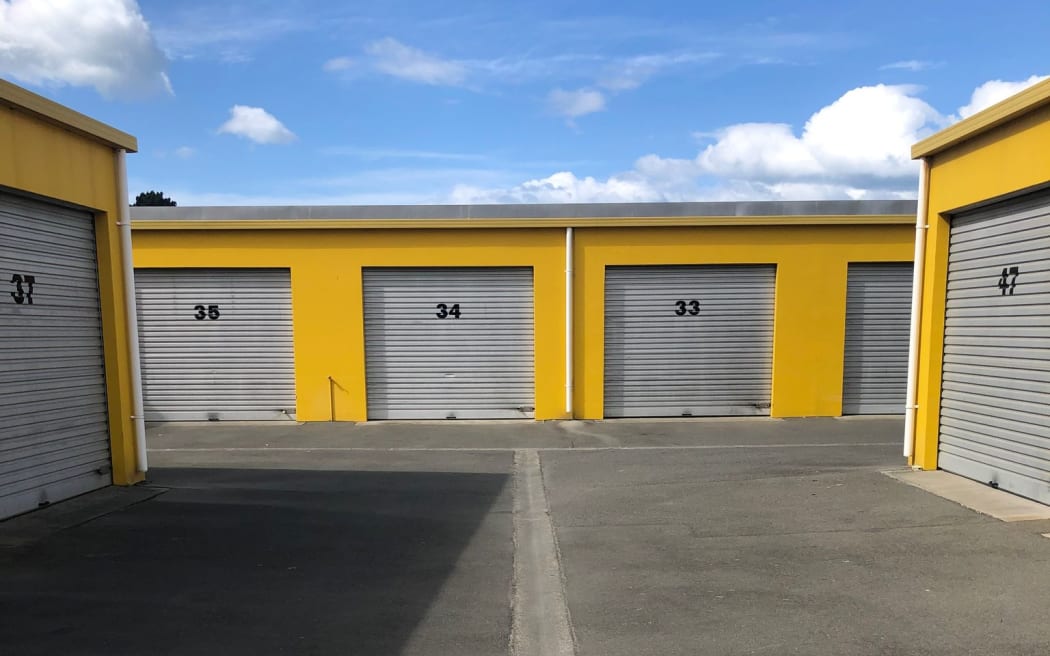
The storage facility that houses Melted Ice Cream's practice space Photo: Tony Stamp
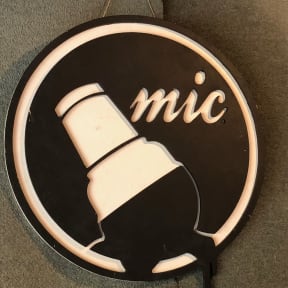
The Melted Ice Cream logo in their practice space Photo: Tony Stamp
Inside there’s carpeting, a drum kit, a plethora of instruments, mixing desk, and an old four-track tape machine.
“Instead of trying to be hi-fi I will route audio through something shitty,” says Brian of the aged gear, “to make it sound more interesting.”
Melted Ice Cream has spent years being a zero-profit endeavour, and is finally starting to turn a profit, but Brian stresses it’s very small. “There is money in the bank account now. I can pay for the next record,”
He continues, smiling, “Mind you, I haven't really paid myself. Maybe I should just do that and then shut up shop and then be done with it.”
Melted Ice Cream served as inspiration for another label which operates out of Dunedin, called Trace / Untrace.
“They were just people in New Zealand making tapes,” says label boss Julie Dunn, “and we thought that was really cool.”
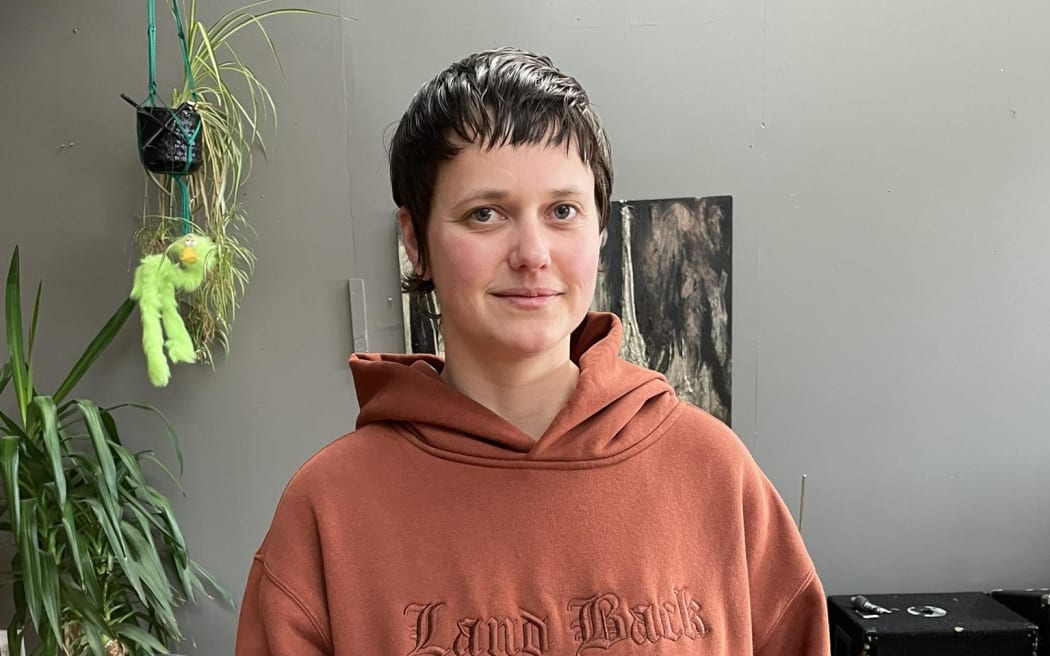
Trace / Untrace label boss Julie Dunn Photo: Tony Stamp
Initially founded by Richard Ley-Hamilton, of the band Asta Rangu, it was the product of conversations with Julie when they were giving him driving lessons.
“We were talking a lot about our friends' bands and realising that we had a shared interest in the metasocial aspects of bands in Dunedin: relationships between bands, and around bands, and all the community stuff that just organically grows up through bands playing gigs together and using spaces together.”
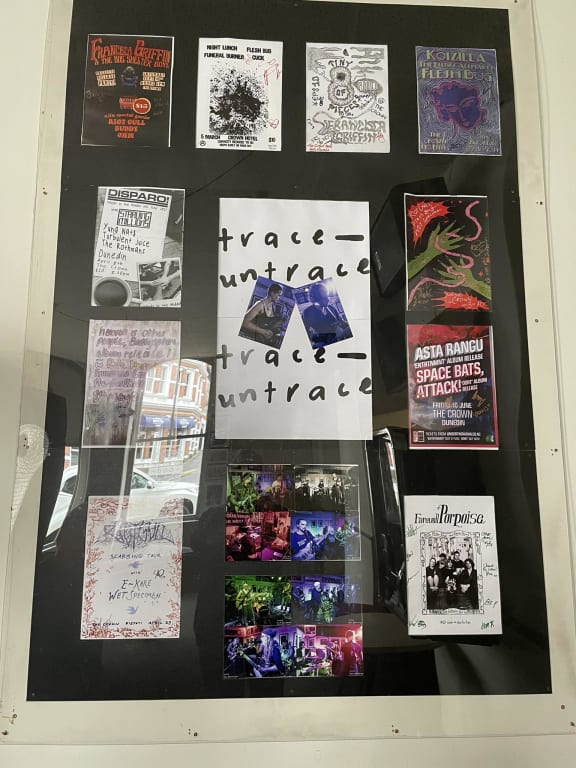
Trace / Untrace display at The Crown Hotel Photo: Tony Stamp
Julie refers to Trace/ Untrace as a collective as much as a record label, likening it to 'a form of glue to hold everybody together', or 'a home for people to come back to'.
“At a certain point, you ask yourself ‘why am I actually doing this, what parts of this are valuable for my community. and what things can people not get anywhere else?’”
They say the label is less involved with things like funding applications, which are often left to the artists, and can be challenging in that part of the country.
“So many of the funding boxes to tick are to do with numbers: numbers of plays on Spotify, people who've been to your gigs, those sorts of things. There’s just genuinely less people down here, and it's harder to open for international acts down here.
“I do think that maybe some of the criteria could be adjusted or re-imagined.”
The label’s roster includes bands like Bathysphere, Koizilla, Dale Kerrigan, and solo acts Fazed on a Pony and Neive Strang. Guitars are a common denominator, and some acts tend toward the heavier end of the spectrum, but it's otherwise eclectic.
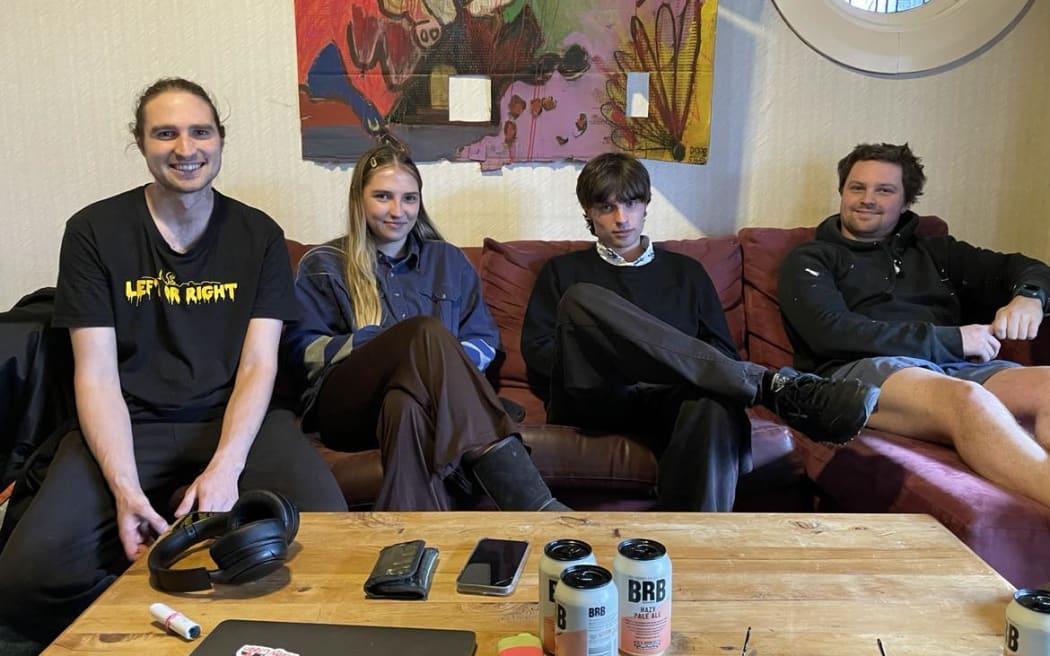
Dale Kerrigan (Josh Nicholls, Shlee Nicholls, Joel Field, Connor Blackie) Photo: Tony Stamp
Julie says they tend to sign artists with shared values, “people who are making it to make it for themselves”, rather than oversized ambitions.
“Maybe it's just to do with the fact that it's so inwardly facing [in Dunedin], and we're not playing for other people. We're playing for each other.
“It's not that we're making music to be heard by audiences other than who's directly in front of you at that gig, at The Crown, on that night.”
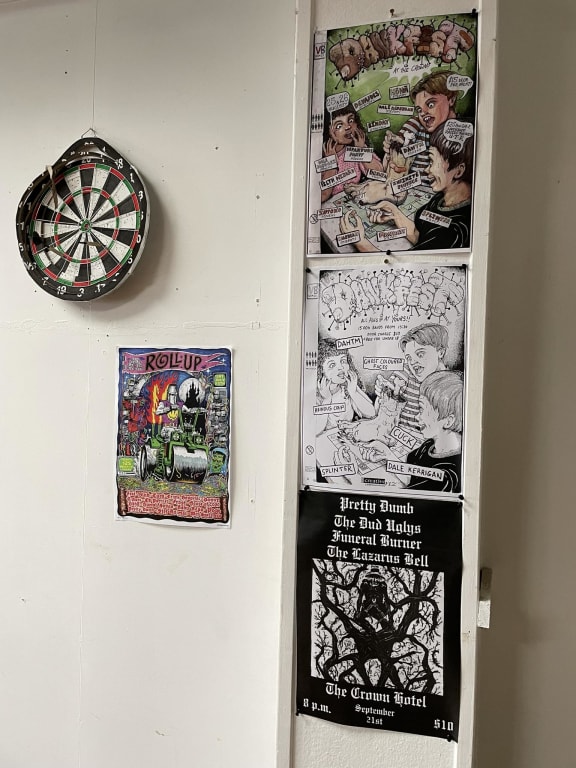
A wall at Spaceland practice space, where some Trace / Untrace acts rehearse Photo: Tony Stamp
Julie pays for the label’s website and dubs the cassette tapes themself, a process people have told them to farm out, but they say is too much fun. And like much to do with Trace/ Untrace, there’s a political underpinning to that, too.
“I guess that my way of understanding what Trace / Untrace is, is really based around cassettes. I feel like it's something that I can offer.
“Life on the internet is really changing how we live, and it's nice to have tapes that you can actually hold, and it's nice to have people that you can go and see, or someone that you can go and talk to about ‘how do I make a t-shirt for my band at home without spending a million dollars?’”
Artists on the label have received plays on German radio (Julie only knows this because they’ve been tagged on station’s Facebook pages). They assume that’s because they were discovered on Bandcamp, and through that website they’ve sold tapes in Taiwan, America, and Australia.
Like Melted Ice Cream’s Brian Feary, Julie works on the label in their spare time, outside the demands of a considerable day job, “logisticizing the loading of the Ministry of Education's new websites to host the New Zealand curriculum Te Whāriki, which is the early childhood curriculum, Te Marautanga o Aotearoa, which is the Māori-medium curriculum.”
They also find time to help with Re:Gear, a govt-funded project to fix broken musical gear, teach people how to fix their own gear, and create communal knowledge around the topic. They want to stop things ending up in landfill.
Julie says coming out of the COVID lockdowns and seeing live music again was a profound experience for them, and confirmed that they had to give as much to this project as possible.
“There's so much amazing music in Dunedin,” they say, “and I loved the idea that someone would find one of those bands, and then go on to find a bunch more bands that were different, and equally as awesome.”
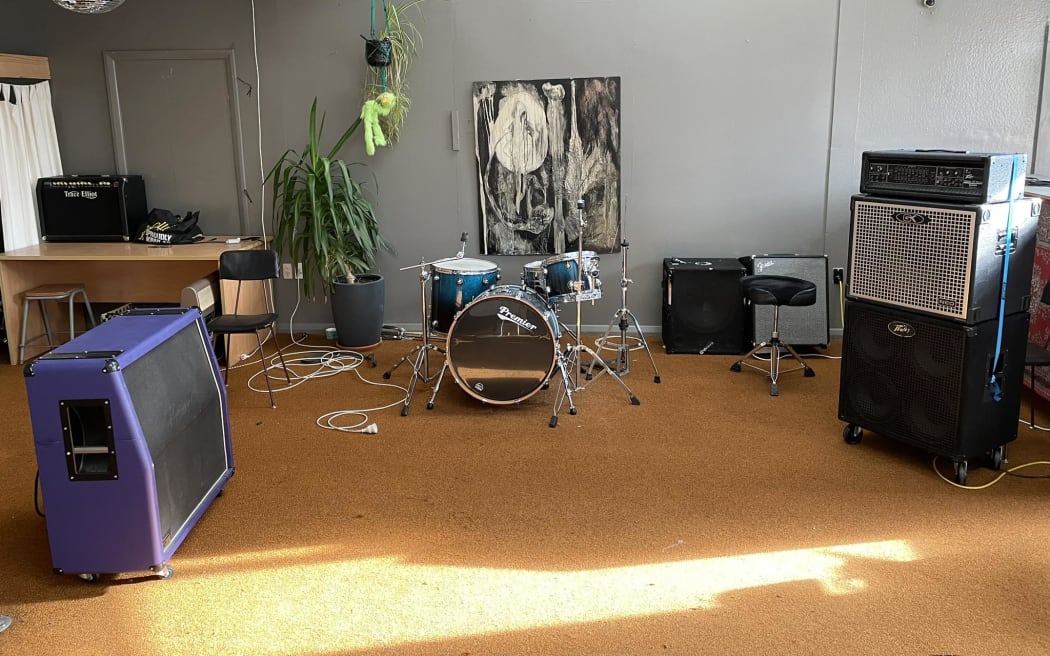
Spaceland Photo: Tony Stamp
Both Julie Dunn and Brian Feary play in some of the bands they represent. Similarly, Wellington label Meetinghouse was founded by musicians who decided to join forces.
Mara TK is the son of psychedelic guitar legend Billy TK. He found international success in the group Electric Wire Hustle, and in 2021 released his solo debut, the highly acclaimed Bad Meditation.
Mara says he founded Meetinghouse because “I just wanted a home, and a way for people to find artists that I really loved, and who might benefit from a home as well.”
The label is run by Mara in conjunction with two other artists, Aja Ropata, and Maarire Brunning-Kouka, who makes music under the name MĀ.
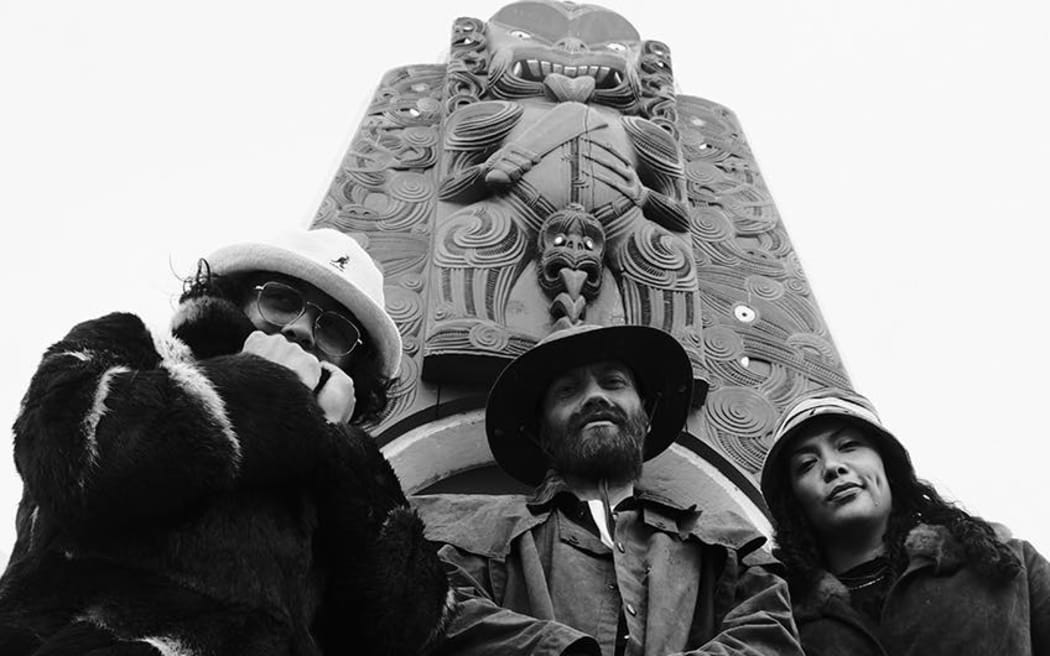
Meetinghouse founders MĀ, Mara TK, and Aja Photo: Alex Wong
“We were all just friends before we started to make any music together, or think about releasing music together,” says Mara. “Asa's partner is one of my best mates. He's a really amazing theatre performance artist.
“He was doing these performance pieces and had us come and sing in them, that's how the two of us met. And then also through a theatre connection we met Maarire, through her mother Nancy Brunning, and her father Hone Kouka.
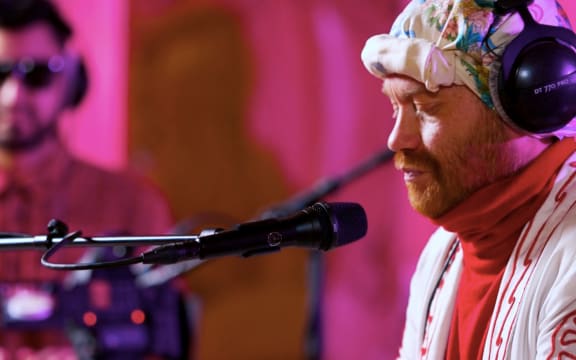
Mara TK performing at RNZ Photo: Luke McPake / RNZ
“We started hearing some of her pieces that she had been working on. I felt like she could do with a home as well.”
Mara stresses the label’s founding principle of manaakitanga (showing respect and generosity), saying “it’s helped us so much. It just means to look after each other. As an example, kai is my first stop. You can make friends so quickly just by buying them a coffee.
“There's something innate with feeding people, I think that's why it's such a huge thing in lots of different cultures.”
Mara talks about working on the Ka Hao album with Rob & Cilla Ruha at Massey University. They’d bought 40 kids from the East Coast. Mara says by the end of the week the musicians were bringing their own kids, and eventually the staff were too. He says this is an example of extending manaakitanga to family members.
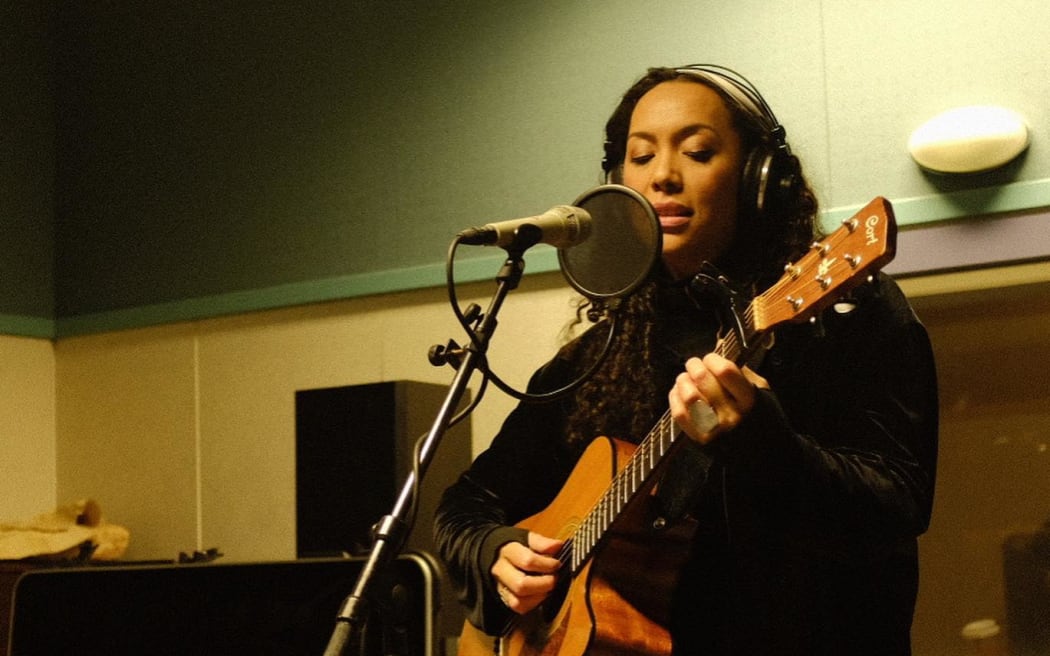
Wellington musician AJA performing in RNZ's Wellington studio Photo: Leo Coghini
Meetinghouse co-founder Aja Ropata found success at the 2022 Silver Scroll Awards, winning the Maioha Award for the waiata ‘Te Iho’, with her co-writers Byllie-Jean and Chris Wethey.
She’s grateful to have Mara as a partner in the label, saying “he's been carving his own path for quite some time now. He's like our tuakana, our older brother, or older cousin.
“He's good at figuring out where we're at, and then making all these wonderful suggestions, right down to the approach of music, or business decisions.”
Part of Aja’s desire to join Mara in Meetinghouse Records stems from past experience.
“I was feeling a little boxed in about what I could and couldn't do. I had a really strong sense about whānau, and I really wanted my family to be involved.
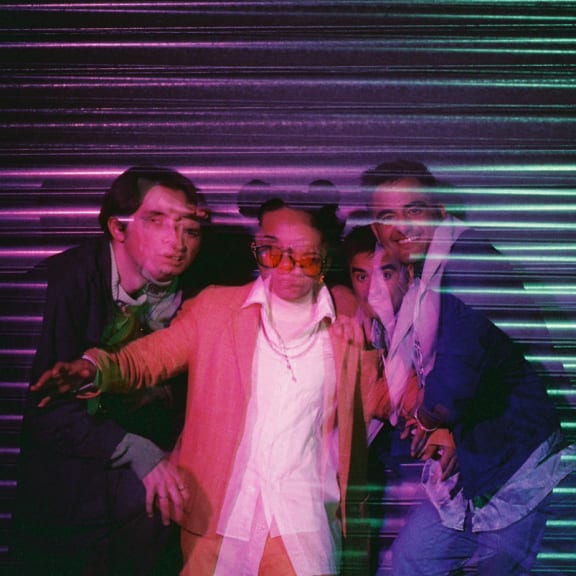
Iti Bubbas (Wynona, MĀ, & Tama) Photo: Bandcamp
“It is easier to work with people that understand you in almost every way. That safety is important.”
Music career aside, Aja holds a full time job as Kaiako, or teacher, in immersion Māori. Not just that, she’s become assistant principal at the school she works for.
The third founder of Meetinghouse, MĀ, works for Te Rūnanga o Toa Rangatira as a ranger on Kāpiti Island. It’s also a full-time job.
MĀ makes music solo, and as part of the trio Iti Bubbas. Of the label, she says “Meetinghouse is like a cloak for us, that's going to keep us safe, keep us communicative, keep our values in check.
“We're trying to find ways for Māori to be able to create, independently or collectively, in ways that we understand.”
At the moment the label just outputs the work of its founders, but they all say they want to work with other Māori musicians. Mara also mentions plans to branch out into music publishing, and composing for film and TV.
“I'd love for the label to have enough resources to get to a place where we call the shots. If we are uncomfortable with something, then we don't have to do it. We can find another route. So we're playing the game on our own terms.”
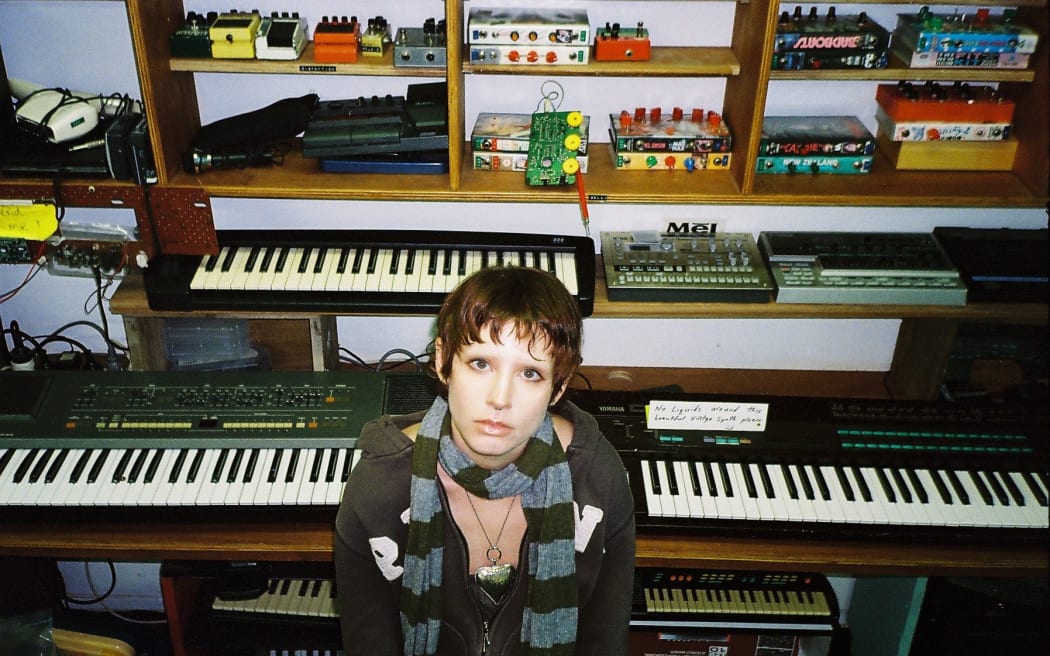
Related Articles founder Grace Verweij Photo: Supplied
The person behind Auckland’s Related Articles says its output includes “wonked out siren-heavy footwork, happy hardcore, ambient, musique concrete, maximalist breakbeats, and ambi-sonic multichannel work”.
It’s fitting the label is partly run from Audio Foundation, a space which aims to nurture experimental music and sound art.
Founder Grace Verweij says they look to sign “people that are pushing genre constraints and doing something a bit marginal, a bit interesting.
“Another unifying principle of the label is elevating artists who are at the beginning of their careers, or have just self released, or aren't really receiving the recognition that I feel that they deserve.”
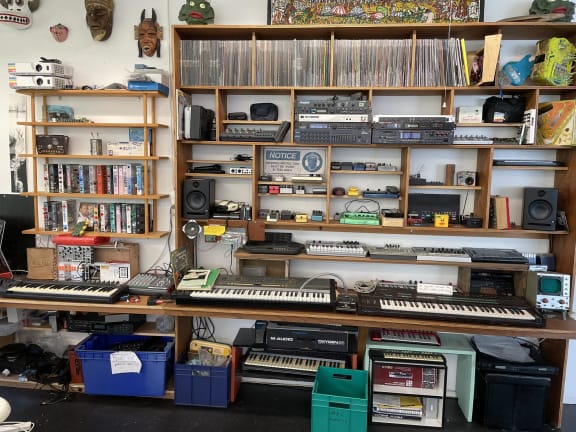
Audio Foundation's electronics library Photo: Tony Stamp
The label’s name is a wry comment on its diverse roster.
When they were younger Grace was a regular at Christchurch hardcore shows, (the guitar band type of hardcore). They say they didn’t see a woman perform onstage till they were 19, and had moved to Melbourne.
After relocating to Auckland in 2013, and seeing female musicians in bands like Civil Union, and New Gum Sarn, they started playing drums, and soon after discovered the Audio Foundation.
They credit its electronics library, started by musician Pat Kraus, as key to their own musical development, saying “accessibility was a key factor. The library is made up of homemade and donated electronic musical instruments, effects units, and oscillators which you can rent for free.
“It was just such an encouraging environment, and for me to be able to take those things home and experiment on my own was really, really important for me.
“I don't think that the noise music and harsh industrial stuff I was originally making was very good. But I was supported by this place in doing it.”
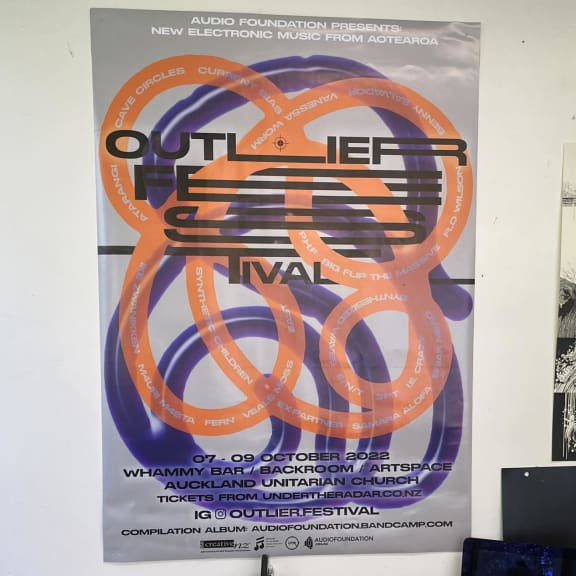
Outlier Festival poster at Audio Foundation Photo: Tony Stamp
Grace’s day job is at Audio Foundation, in a role that includes putting on events. They also run their own festival, called Outlier, which hosts exploratory electronic musicians.
Similar to Melted Ice Cream and Trace / Untrace, Related Articles offers cassette tapes (as well as CDs). Grace’s job offered them the resources to duplicate large numbers. For one compilation they “did a whole run of maybe like 80 or 100 tapes and then re-record it over all of them because I was not happy with how they sounded.”
There’s an element of trial and error that comes with being a one-person operation, but Grace says although they “sometimes fantasise about what it would be like to have other people to bounce ideas off, and share the load, and help drive motivation,” they acknowledge that being a solo project is “the reason that it has such a distinctive identity”.
An early source of encouragement and technical help for Grace’s solo project Sequentia, as well as Related Articles, was their partner Reuben Winter, who made music as Totems, Milk, and more. Winter died in 2020, leaving a legacy as a fertile musical mind as well as an enthusiastic supporter of many local acts.
“He not only mastered the first four releases that I put out, but he supported me so generously and tirelessly,” says Grace, “he taught me everything I know about producing, about mixing, about touring bands, about being in a band, and about running a label, with endless patience.
“His opinion and his taste was a highly valued and pivotal influence in that early decision making. If I didn't have someone who believed so vehemently in whatever I set out to do I'm not sure that the label would exist: the main force driving me to continue and grow the label is his mana.
“I’m doing it for an undying love of him and to make him proud.”
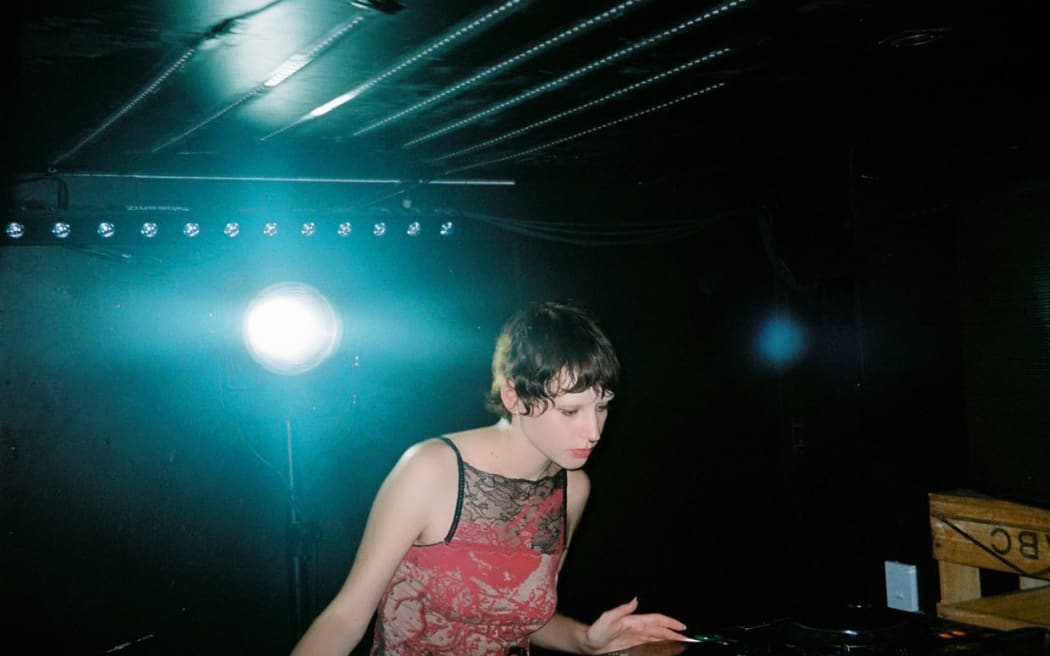
Grace Verweij performing Photo: Supplied
Grace’s personal history is interwoven with the label, and their desire to champion undersung acts. But that’s something which takes extra effort.
“You have to work harder to get people to care,” they say, “but I think that's how it should be. You have to put in that work to make change in the community.
“I think what I've tried to build with Related Articles is a unique identity that people can trust as a way of giving that platform to lesser known artists, but it can be difficult.”
Like all the people running these micro-labels around the country, the motivation driving Grace to undertake this work in their free time is the same. A love of music.
“I think whether it becomes financially lucrative, or even financially viable, is of less concern to me.
“Maybe that's because of a complacency towards the nature of selling music in the digital streaming age, or potentially, of existing within a small niche within an already small music industry.
“But I think it's actually more likely to do with the fact that it is a passion project of love. And there's no way that I could not do It.”
Music played in this feature:
Salad Boys- Daytime Television
Ben Woods- Lozenge
Wurld Series- Grey Men
Best Bets- Whataworld
Jim Nothing- Seahorse Kingdom
Asta Rangu- TOO-ZOOMA
Koizilla- Ornithology
Neive Strang- Could I Reset
Fazed on a Pony- Grim Judy
Mara TK- Grrl
MĀ- Tāua
Aja- Non Handler
Aja- Kawai
Byllie-Jean- Te Iho
MĀ- Green
Mara TK - Te Kete Aronui
Totems - Stunt 151
Current Bias - L-Faery Nu Trod-L
Laced - Starclip
Current Bias - Cyclic Cradle
Sequentia - Resonant Tuning
GG Mothra - Ladei

